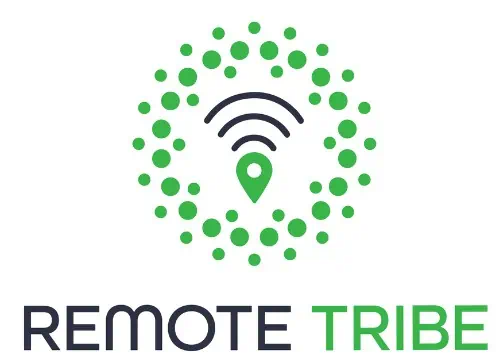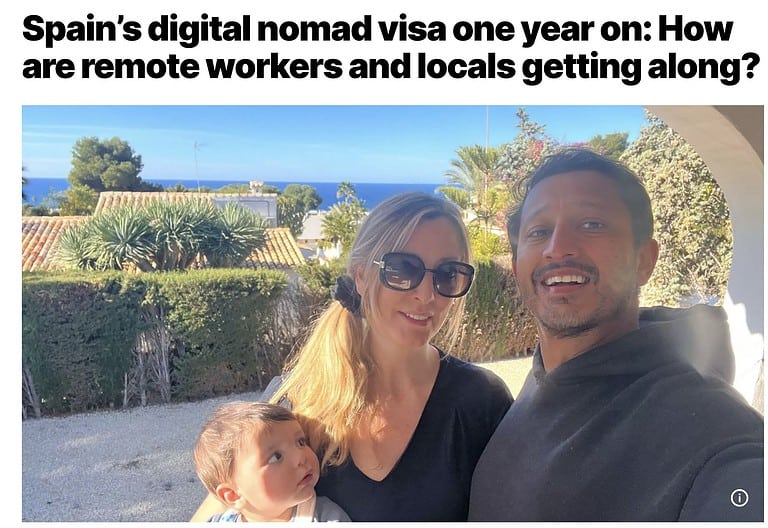Spain digital nomad visa

Everything you need to know about getting a visa and living in Spain as a digital nomad or remote worker
Visa Length
12 months
Extension Possible
Yes, up to 5 years
Citizenships Accepted
Non EU Citizens
Minimum Income Req.
€ 2,650/ month per person
Schengen Visa Access
Yes
Time to approval
1-3 months





Brief facts about Spain
Language
Spanish
Population
47.5 Million
Continent
Europe
Climate
Central inland areas have continental climate while the north and northwest regions are oceanic.
English Spoken
Scarcely
Major Cities
Madrid, Barcelona, Seville, Valencia
Location
Spain Digital Nomad Visa - Quick Facts
Spain introduced the Digital Nomad Visa in January 2023, as part of the new Startup Act. This visa allows non-EU/EEA remote workers and freelancers to live and work in Spain for up to 12 months initially, with the possibility of renewal for up to five years.
To be eligible, applicants must demonstrate a minimum monthly income of €2,650, with higher income requirements if accompanied by a partner or children. Remote workers must provide evidence of a stable contract, permission from their company to work in Spain, and proof that their company has been operational for at least one year. Notably, freelancers can derive up to 20% of their income from Spanish clients, a unique aspect of Spain’s Digital Nomad Visa compared to others.
Successful applicants can apply for a Spanish residency permit, which grants them the ability to travel within the European Union. Most visa holders will become tax residents and be eligible for a special reduced tax rate of 24% on income up to €600,000 per year. Spain has double taxation agreements with 90 other countries. Some of these countries include the United States, United Kingdom, all EU countries, Canada, Australia, and New Zealand.
Requirements for Spain Digital Nomad Visa
- A Valid Passport
- Health Insurance
- Proof Of Employment Contract - Remote
- Minimum income of €2,650/month
- Have a degree or 3 years of experience (more below)
- 3 months of remote working experience
- Not having lived in Spain in the past 5 years
Spain Digital Nomad Visa requirements - Detailed
Below we go into the detailed requirements for the Spanish Digital Nomad Visa, which is open to all remote workers, freelancers, and self-employed individuals who are not EU/EEA citizens.
1. Proof of Financial Sustainability
The Spanish government wants you to prove that you have sufficient income to support yourself while living in their country.
The current income requirement for a person applying for the digital nomad visa in Spain is double the Spanish national minimum wage. Hence, to apply for the visa, you need to earn:
- €2,650 per month
- aprox €31,800 per year
If you plan to include family members in your digital nomad visa application, the minimum income requirement increases. For the first additional person, such as a spouse or child, the minimum income you need to show is 175% of the base requirement for an individual applicant.
For each subsequent dependent family member included after that, the minimum income threshold increases by an additional 25% per person. This means that having more family members on the application raises the overall income you must demonstrate to qualify for the digital nomad visa. When applying with family members, you must also submit proof of relationship, such as a birth or marriage certificate.
You will have bank statements, payslips, and employment contracts to prove your income.
2. Proof of Remote Worker Status
To obtain the Spanish digital nomad visa, you must first validate your status as a remote worker capable of performing your job duties from Spain via an internet connection. On top of this, remote workers must demonstrate that the company they work for has been in operation for at least one year.
While there are no specific restrictions regarding the nature of your work, you must demonstrate your expertise in your respective field. You can do this by presenting a university degree, professional certification, or evidence of at least three years of relevant work experience.
Also, you must prove that your work is well-established. This means having been employed in your current role for a minimum of three months. Remote workers should provide a contract demonstrating their employment duration in Spain. For freelancers, they have to submit long-term contracts as proof of their stability.
While many other digital nomad visas require the income to be produced only from a source outside the country, the Spanish visa allows freelancers and self-employed individuals to work for Spanish clients, provided that such income does not exceed 20% of their overall earnings.
3. Comprehensive Health Insurance
As part of the documentation you have to submit to the Spanish authorities, you will be asked to have international health insurance when you apply. This is valid for any family members that accompany you for the full duration of your stay in Spain.
Unfortunately, there are currently no guidelines for how you can contribute to and if you can benefit from the Spanish healthcare system.
4. Minimum Stay Requirement
To be eligible for the Spanish Digital Nomad Visa you should not have lived in Spain for the last five years.
There is no minimum period for your initial visa application or stay in Spain. However, if you tend to renew your DNV, you must have stayed in Spain for at least six months within a 12-month period.
5. Clean Criminal Record
Like many other DNVs applications, applicants for the Spanish visa must show they have a clean criminal record from all the countries that they have lived in for the last five years. The form of proof that can be provided depends on the type of documentation used in the relevant country.
The document should be translated into Spanish by an approved body and must be must be apostilled by the issuing country.
eligibility requirements
Who is eligible for the Spain digital nomad visa?
Applications for the Spain Digital Nomad Visa are open to non-EU/EEA citizens. Citizens of the European Union and European Economic Area do not need a DNV to work remotely in Spain.
United States citizens and Green Card holders, as well as citizens from Australia, New Zealand, and Canada, are all eligible to apply. You can apply at a Spanish embassy in your country or enter Spain as a visa-free tourist and apply well before your 90-day visitation period has expired.
Spain has double taxation agreements with the United States, Canada, Australia, New Zealand, and all European Union countries, so you will not need to pay tax on your international income twice if you become a Spanish tax resident.
Pinak Pushkar and his wife Cathy moved to Spain from the UK on a digital nomad visa. Read more about their life in spain after one year.- Copyright Pinak Pushkar and Euronews.
Taxes as a digital nomad under this visa
If you choose to stay in Spain for more than 183 days in a year on your Spanish Digital Nomad Visa, you will become a resident for tax purposes. However, even if you spend less time in the country, Spain could still consider you a tax resident. This can be the case if you have your center of activities there or if your family lives there.
Even though Spain has a low cost of living and a great lifestyle which is very attractive, non-residents on a digital nomad visa are subject to a 24% tax rate, applicable up to €600,000 per year during the initial four years of their Spanish stay. Any income above this threshold is subject to a 48% rate. Still better than the standard tax rate of 50%. In order to benefit from this tax regime, you will need to file an application with the Spanish tax authorities within 6 months of obtaining your digital nomad visa.
The good news is Spain maintains double taxation agreements with 90 countries, like the United States, United Kingdom, Canada, Australia, New Zealand, and all EU member states. This means that if you’re already taxed on your foreign income in your home country, you’ll be exempt from being taxed again on the same income in Spain.
How Much Does It Cost to Apply for a Spain Digital Nomad Visa?
You should expect the application fee to apply for Spain’s digital nomad visa to cost you around €80.
You can expect to get a payment via bank transfer when you receive the appointment from the Spanish Embassy after submitting all the documentation. The fee varies between different countries but is usually around €80.
There is an additional €20 fee when applying for your NIE number.
Waiting time for obtaining the Digital Nomad visa
Once you have obtained the relevant documentation to make your application, it can take anywhere from 4-12 weeks to make your appointment at your closest consulate or embassy and receive your visa.
FAQs about Spain Digital Nomad Visa
Digital nomad visas are a relatively new thing on the market.
Unfortunately, for some visas, there’s not enough clarity on the details, leading many people to get easily confused between differences in paperwork, travel lengths, visa types, etc.). Please refer to the FAQ below, which should answer some of the most common questions on the digital nomad visa for Spain.
Is it expensive to work and live in Spain?
The cost of living in Spain can vary depending on the region and city you’re considering living and working in. Generally, Spain can be less expensive than some parts of the United States, especially major metropolitan areas like New York or San Francisco. Compared to other places in Europe, Spain tends to be more affordable, although again, it depends on the specific location.For example, a rent for a 1 bedroom flat in Valencia which is a mid-size city is about 450 euros/month.
On the opposite end, cities like Madrid and Barcelona can be more expensive than smaller towns or rural areas like the ones on the South Coast of Spain. Housing, transportation, and dining out are factors to consider when comparing costs. Overall, Spain often offers a good balance of affordability and quality of life compared to other European countries.
How long does it take to obtain the Digital Nomad visa for Spain?
it can take anywhere from one and three months to make your appointment at your closest consulate or embassy and receive your visa after you have submitted all your hefty paperwork.
Will I get any tax breaks for as a digital nomad in Spain?
Yes, the official website of the Spanish government can be found here. Website is in Spanish so please use Google Translate.
Who is eligible for a nomad visa in Spain?
Non-EU/EEA citizens are eligible to apply for the Spain Digital Nomad Visa.
Eligible applicants include United States citizens, Green Card holders, as well as citizens from Australia, New Zealand, and Canada.
How much tax do digital nomads have to pay in Spain?
Non-residents, including digital nomads, under this visa are subject to a (reduced from 48%) 24% tax rate, applicable up to €600,000 per year during the initial four years of your Spanish stay. Any earnings above this amount are taxed at 48%.
Remember though that Spain holds double taxation agreements with 90 countries like the United States, United Kingdom, Canada, Australia, New Zealand, and all EU member states. This means that if you’re already taxed on your foreign income in your home country, you’ll be exempt from being taxed again on the same income in Spain.
What is the official website for Spain digital nomad visa?
The Spanish government does have an official website for digital nomads that you can access here. Make sure to use Google Translate because the website is in Spanish only.
How long can you stay in Spain on the digital nomad visa?
With the first emission of the visa, you can stay one year, but you can extend it up to five years.
What is the minimum income requirement for a nomad visa in Spain?
The minimum income requirement at the moment €2,650 per month per person or aprox €31,800 per year.
Does Spain have a digital nomad visa?
Yes. Starting with June 2023, the country has releaseed its digital nomad visa program. This allows freelancers and remote workers from outside the EU to live and work in Spain for up to five years.
The applicants have to meet the minimum income requirement, currently set at just €2,160 per month per person.
Tell me more about Digital Nomad Visas
Sure! We’ve got a fantastic article with the most popular questions about digital nomad visas in general . You can find it here.
What is Digital Nomad Visa?
A digital nomad is someone who lives a nomadic lifestyle and works remotely from outside their native nation using technology. A digital nomad visa is a document or programme that allows someone to work remotely while living in a nation other than their permanent residency.
Most nations that award digital nomad visas do not use the word “digital nomad visa,” instead giving their programmes a distinctive name, such as the Cayman Islands’ Global Citizen Concierge Program, or using more broad phrases like residency permit or “long stay visa”. However, keep in mind that these visas may not specifically target digital nomads.
Newsletter
Get our best tips on location independent lifestyle FOR FREE!
No Spam 🙏🏻











